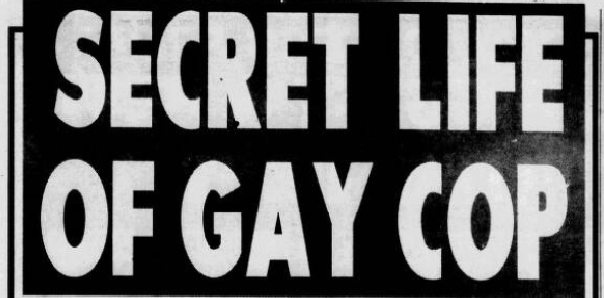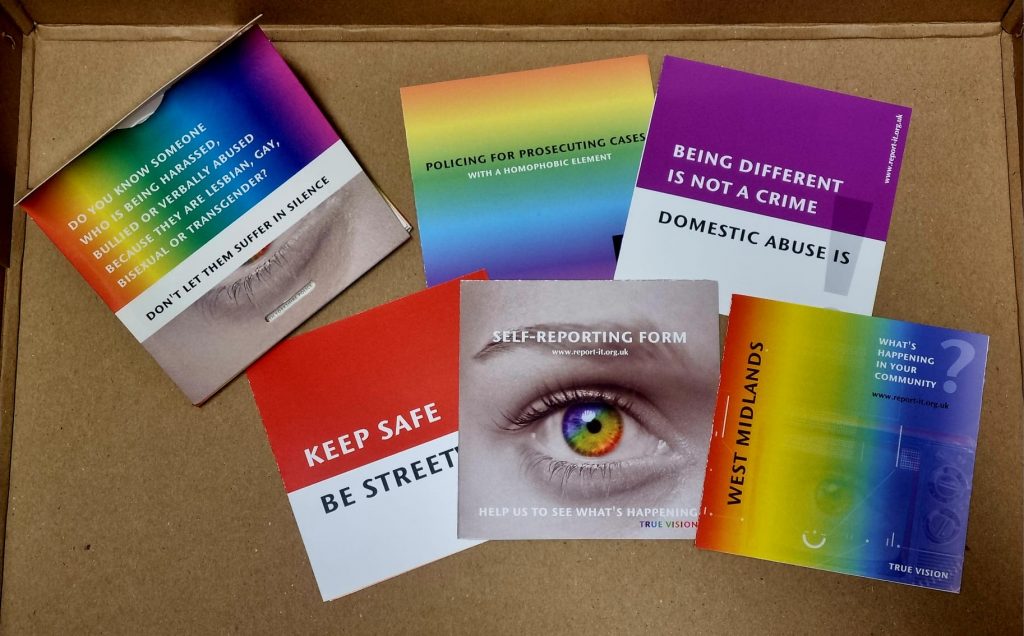Published on | General
It would be remiss to pretend homophobia has not existed historically, both publicly and within the force, and many an officer certainly faced criticism, fear, and abuse for who they were – but here we would like to give no further spotlight to those who held such views in the past, and instead highlight those who supported or were a part of our community. To do so we’ve been taking a look at some of our early stories and histories of LGBT+ officers in the force who pioneered the way for others.

Birmingham Evening Mail, Saturday 31st July 1999
In 1999 the above headline, “Gay Police Pair ‘Marry'”, was splashed across the Evening Mail front page.1 Acting Inspector Janet West and WPC Sarah Thomas held a blessing ceremony to celebrate their relationship, with family and friends in attendance – the first of its kind in the UK between two serving officers. Both adopted the surname Thomas-West after the ceremony, and their ‘marriage’ was officially recognised by West Midlands Police force, though it is worth noting they were not afforded the same pension rights as married heterosexuals at the time. Though there was some public backlash, including negative views shared by some members of the WMP Authority and retired officers, the force publicly stood by the pair.
“It is a shining example of tolerance and understanding within the police service. It is also an illustration of how times have changed. There’s no doubt that similar relationships have long been formed between officers but ten years ago it would have been much more difficult for a couple like this to come out into the open.”
Sergeant Bob Davey, chairman of the Police Federation in 19992
The story appeared several times in papers over the following weeks; on the 3rd of August an article titled “Gay pair ‘led to faith in police'” appeared in the Evening Mail.3 Again, Janet and Sarah Thomas-West did not offer comments to the press, but were praised by colleagues in the force who believed their ceremony had ‘engendered more faith in the police’ which was especially seeking to promote its diversity.
“We welcome all officers from all aspects of society, regardless of sexuality, gender, or race. It is about time the law was changed to allow gay people to marry formally and legally.”
Paul Cahill, Gay and Lesbian Police Officers Association – Sunday Mercury, August 1, 1999
Colleagues who supported the union, and other LGBT+ officers, created the Rainbow Network in 2000, which has since developed to become the LGBT+ Network to reflect the diverse members and communities it now supports. It aims to improve trust and confidence in our wider LGBTQ+ community and support internal LGBTQ+ colleagues.

Birmingham Mail, Friday 29th March 1996
There is no doubt that Janet and Sarah sparked debate and activism within the force, but their’s was not the only story to appear in the local press. A few years earlier, in 1996, at least two officers stepped forward to share their story of living a double life as both officers and gay men. ‘Secret Life of Gay Cop’ titled the article concerning Rob Burlace who had served for 18 years at the time.4 Rob told the press that when he phoned his boss, a police inspector, and came out as a gay man there was a moments silence before the reply ‘no problem.’ For years Rob had led a double life, taking part in sports activities with his colleagues as he felt it was ‘expected of me’, whilst spending his weekends travelling as far as Manchester to attend gay clubs – avoiding Birmingham for the fear of being recognised.
“Lesbian officers were traditionally tolerated, but, as in the macho barracks of the military, there was no room for ‘outed’ gay men.”
Birmingham Mail, Friday 29th March 1996
For Rob the turning point came following a derogatory comment being made during an equal opportunities training course. “Someone made what I considered an offensive remark about gays and it took all my patience to stop me really launching into him. I suppose that was the last straw.” Following telling his family and colleagues Rob felt “a great sense of relief” and was happy to find his fears groundless as he experienced little negativity shown towards him.
“At the end of the day, it shouldn’t matter if I’m gay or not. I’m a professional doing the job to the best of my ability. That’s all that matters.”
Rob Burlace, Evening Mail, Friday March 29th 1996
A few months later Sergeant Bernard McEldowney also stepped forward and shared his story. Whilst being filmed as part of a TV programme Crime Stalker Bernard revealed his sexual orientation. “People have had their suspicions for a long time – I suppose this will confirm their belief.” Similar to Rob, Bernard stressed that his service in the force should speak for his character, rather than his orientation; “People should judge me on my record for the last 14 years. If they can’t, they are being stupid and immature.” Indeed, this was the stance taken by the Community Services at West Midlands Police who said they were ‘indifferent’ to an officers sexuality as long as they were doing a good job.

Foldout card packaging (in the shape of a cross) for a set of 7 small leaflets + prepaid addressed envelope as part of the “True Vision” campaign against hate crime, specifically of a homophobic or transphobic nature.
Created by West Midlands Police, 2005
The West Midlands Police Community Services felt that it was time to disprove the assumption that the ‘macho’ organisation of the force was inherently homophobic, telling the press of the time that they had established dedicated support and counselling services for any officers who experienced homophobia and discrimination and were “undergoing effort to change people’s perceptions of homosexuals”. Despite this, they did not, at the time, follow in the footsteps of other forces such as South Yorkshire Police or Sussex Police who had directly campaigned for more homosexual officers to join the force.5 Instead West Midlands Police argued that “sexual orientation is not an issue ever considered when recruiting someone” and that it would continue to recruit from across the whole range of society. By the turn of the century West Midlands Police force had the highest number of female officers anywhere in the country, and 14% of its staff were from ethnic minority groups. 6 years later in 2005 27% of officers were female, and the force was named as one of the top 10 ethnic diversity employers, as well as ranking 59th in the Stonewall Corporate Equality Index of top employers for gay and lesbian staff.
If you have experienced a hate crime, or want more information on how to report them, click here.
- Evening Mail Voted Britain’s Top Community Newspaper Saturday July 31 1 999 Cl 30p Lohdoi Five Star Hotel For Animal | Birmingham Mail | Saturday 31 July 1999 | British Newspaper Archive ↩︎
- 2 Evening Mail Saturday July 31 1 999 Cl Mum Chargeoafter Gun Smuggling Raid Special Correspondent A 32-Year-Old Woman Has | Birmingham Mail | Saturday 31 July 1999 | British Newspaper Archive ↩︎
- Evening Mail Tuesday August 3 1999 3 Costumes Firm Gets 2000 Items From Hit Show The Fashions That Helped Create | Sandwell Evening Mail | Tuesday 03 August 1999 | British Newspaper Archive ↩︎
- Tolerant West Midlands Police Force Is Towards Gay Officers Ty Follow The Gay and Lesbian Officers To Could From Truth | Birmingham Mail | Friday 29 March 1996 | British Newspaper Archive ↩︎
- Evening Telegraph Police Advert Goes In Gay Times Police In The West Midlands Say They Have No Plans To Follow | Coventry Evening Telegraph | Thursday 21 November 1996 | British Newspaper Archive ↩︎
